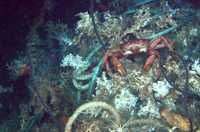Scientists call for protection of deep sea coral reefs from European fishing fleets

A team of scientists is calling for the urgent introduction of marine protected areas after producing evidence of long-term damage being done to deep-sea coral reefs by European fishing fleets.
Using underwater robotic vehicles, the researchers from Plymouth University recorded a diverse abundance of fish at several coral sites in the North East Atlantic – but also signs that reefs are being smashed by modern fishing gear.
They documented more than 30 varieties of fish, including codling and northern cutthroat eels, at coral reef sites 300 km off the coast of Ireland. Diving down to depths of one kilometre, the vehicles took pictures of thousands of fish, and thriving ecosystems, dependent upon the reef.
The project, led by Dr. Jason Hall-Spencer of the School of Marine Sciences and Engineering, also found evidence of damage caused by ‘rockhopper’ trawls that allow fishing nets to be dragged along the seabed even in rough seas. Images of abandoned fishing gear strewn over the sea-bed, which would have the potential to kill to wildlife, were also captured.
Dr. Hall-Spencer said: “European coral reefs take thousands of years to form, and we now have ample evidence that bottom-trawling is causing long-term damage to fish habitat.
“This highlights the need to introduce protected areas as soon as possible, where destructive types of fishing are outlawed.”
The project was conducted under the EU KnowSeas project1. The footage of damage done by trawling, not to mention the evidence of abandoned fishing gear, will now be provided to a number of EU governments.
Dr. Marta Soffker, now a researcher at the University of Exeter, worked on the data for her Masters project. She said: “This research provides further evidence of the importance of European coral reefs as they provide complex habitats that are home to a diverse range of fish.
“We found patches that were densely populated by corals, crustaceans, and fish – but also signs that trawls just plough through rich seabed habitats that can hardly be detected from the surface.”
More information: The research is published in: In situ observations of fish associated with coral reefs off Ireland. Deep Sea Research Part I: Oceanographic Research Papers. 58(8): 818-825. Söffker, M. et al. (2011).
Provided by University of Plymouth

















